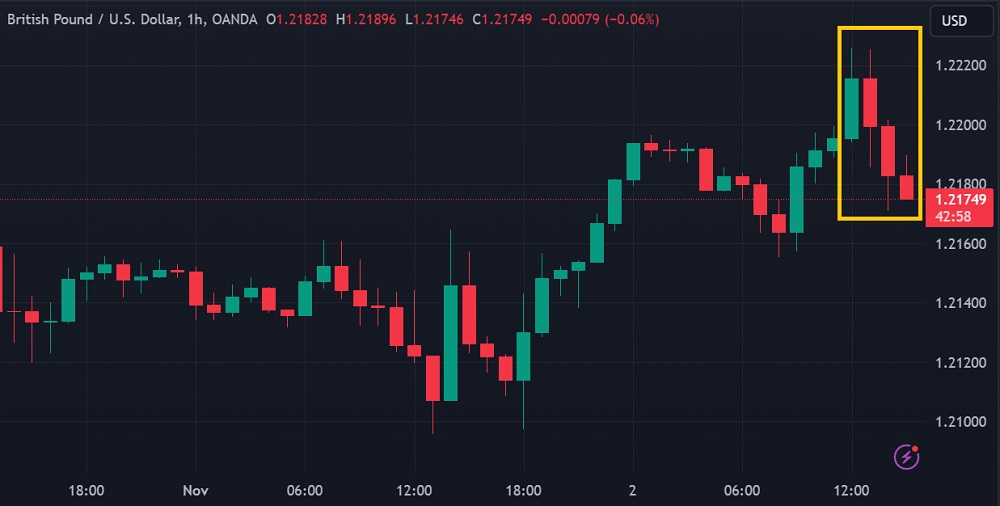Experts doubt the commitment to interest rates by the BoE, causing the Sterling to weaken in GBP/USD and other major currency pairs.
Pound sterling weakened at the beginning of the New York trading session on Thursday, November 2nd. GBP/USD retreated from the daily high around 1.2225 to the 1.2180s, while EUR/GBP rose by about 0.4% to the 0.8730s. This was due to market participants not trusting the commitment of the Bank of England (BoE) regarding interest rates.

The Bank of England's Monetary Policy Committee (MPC) meeting today has maintained the interest rate at 5.25%. Six out of nine MPC members supported keeping the interest rate unchanged, while the other three suggested an interest rate hike. The bias leans somewhat hawkish, as market participants had previously expected at least one MPC member to recommend an interest rate cut.
The BoE also raised its inflation projections for the next two years from 1.65% to 1.90%. These projections indicate that the BoE does not intend to cut interest rates too early. Unfortunately, the market remains skeptical.
Experts doubt the BoE's commitment and continue to argue that the UK is likely to cut interest rates in the coming months. The reason is that the economic conditions in the UK may deteriorate faster than anticipated.
"We are sticking with our forecast that the MPC (Monetary Policy Committee) will reduce Bank Rate by 75 basis points next year, with the first 25-basis-point-cut coming in May," said Samuel Tombs, from Pantheon Macroeconomics.
He also said, "The MPC is currently reactive and backward-looking, and its stance will shift, potentially quickly, as the economic data change."
Julian Jessop, an Economics Fellow at the Institute of Economic Affairs, stated that BoE Governor Andrew Bailey was mistaken in suggesting that it was too early to contemplate an interest rate cut.
Jessop pointed to the weaknesses in economic activity and inflation compared to the Central Bank's projections, the decline in credit and money growth, and the recession signals from business surveys.
The BoE's economic projections suggest that the UK's growth is likely to remain stagnant until early 2025 and stay below historical averages in the medium term. However, it seems that BoE officials argue that the risk of inflation is more concerning than the threat of a recession. This prioritization underpins the BoE's decision to keep the interest rate at 5.25% in today's policy meeting.

 Dedicated FREE FOREX VPS
Dedicated FREE FOREX VPS Free FOREX Virtual Private Server
Free FOREX Virtual Private Server MT4 Demo Contest, Get $500
MT4 Demo Contest, Get $500 Sign Up for an Account, Claim 60% Deposit Bonus
Sign Up for an Account, Claim 60% Deposit Bonus Free MT4/MT5 VPS 2024
Free MT4/MT5 VPS 2024 Send E-mail and Get Free Merchandise
Send E-mail and Get Free Merchandise $1K Refer a Friend Bonus for Pepperstone Pro clients
$1K Refer a Friend Bonus for Pepperstone Pro clients Maximize Your Earnings with 100% Deposit bonus
Maximize Your Earnings with 100% Deposit bonus Trade to Win, $5,000 Monthly Demo Contest
Trade to Win, $5,000 Monthly Demo Contest Claim 30% + 15% Deposit Bonus from LiteFinance
Claim 30% + 15% Deposit Bonus from LiteFinance






